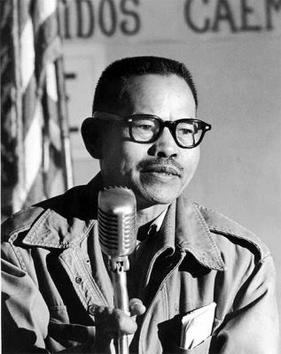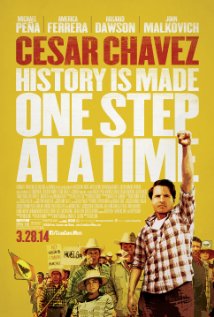
Cesario Estrada Chavez was an American labor leader and civil rights activist. Along with Dolores Huerta, he co-founded the National Farm Workers Association (NFWA), which later merged with the Agricultural Workers Organizing Committee (AWOC) to become the United Farm Workers (UFW) labor union. Ideologically, his worldview combined leftist politics with Catholic social teachings.

The United Farm Workers of America, or more commonly just United Farm Workers (UFW), is a labor union for farmworkers in the United States. It originated from the merger of two workers' rights organizations, the National Farm Workers Association (NFWA) led by César Chávez and Dolores Huerta and the Agricultural Workers Organizing Committee (AWOC) led by organizer Larry Itliong. They allied and transformed from workers' rights organizations into a union as a result of a series of strikes in 1965, when the Filipino American and Mexican American farmworkers of the AWOC in Delano, California, initiated a grape strike, and the NFWA went on strike in support. As a result of the commonality in goals and methods, the NFWA and the AWOC formed the United Farm Workers Organizing Committee on August 22, 1966. This organization was accepted into the AFL–CIO in 1972 and changed its name to the United Farm Workers Union.

Dolores Clara Fernández Huerta is an American labor leader and civil rights activist who, with Cesar Chavez, is a co-founder of the United Farmworkers Association, which later merged with the Agricultural Workers Organizing Committee to become the United Farm Workers (UFW). Huerta helped organize the Delano grape strike in 1965 in California and was the lead negotiator in the workers' contract that was created after the strike.
Amelia "Mildred" Milka Sablich also known as Flaming Milka, was 19 years old when she became a leader in the 1927 coal strike in that state. Her family emigrated to Trinidad from Volosko, Croatia, in 1907. Her father, Anton Sablich, worked as a coal miner in Colorado.
Obreros Unidos (1966–1971) was an independent agricultural labor union founded in Wisconsin in 1966 by Mexican American civil rights activists Jesus Salas, Francisco Rodriguez and many more, originally Texas-based farm workers from the small town of Crystal City. The union took root after a march from Wautoma, Wisconsin, to Madison, Wisconsin that state's capitol to protest the working conditions of the thousands of annual Mexican-American migrant workers who traveled from Texas to Wisconsin each year. This protest march was inspired by the similar march of César Chávez' United Farm Workers (UFW) in California earlier that spring, and the Texas Farmworker march on Austin, Texas of 1966. Obreros Unidos engaged in its first labor action by seeking to organize migrant potato harvest and processing workers in the town of Almond, WI, and received support from the AFL-CIO, Cesar Chavez, and other labor unions.

El Teatro Campesino is a Chicano theatre company in California. Performing in both English and Spanish, El Teatro Campesino was founded in 1965 as the cultural arm of the United Farm Workers and the Chicano Movement with the "full support of César Chávez." Originally based in Delano, California, during the Delano Strike, the theatre is currently based in San Juan Bautista, California.
The Wheatland hop riot was a violent confrontation during a strike of agricultural workers demanding decent working conditions at the Durst Ranch in Wheatland, California, on August 3, 1913. The riot, which resulted in four deaths and numerous injuries, was subsequently blamed by local authorities, who were controlled by management, upon the Industrial Workers of the World (IWW). The Wheatland hop riot was among the first major farm labor confrontations in California and a harbinger of further such battles in the United States throughout the 20th century.

Philip Villamin Vera Cruz was a Filipino American labor leader and farmworker. He helped found the Agricultural Workers Organizing Committee (AWOC), which later merged with the National Farm Workers Association (NFWA) to become the United Farm Workers (UFW). As the union's long-time second vice president, he worked to improve the working conditions of migrant workers.

The Delano grape strike was a labor strike organized by the Agricultural Workers Organizing Committee (AWOC), a predominantly Filipino and AFL-CIO-sponsored labor organization, against table grape growers in Delano, California to fight against the exploitation of farm workers. The strike began on September 8, 1965, and one week later, the predominantly Mexican National Farmworkers Association (NFWA) joined the cause. In August 1966, the AWOC and the NFWA merged to create the United Farm Workers (UFW) Organizing Committee.

Eliseo Vasquez Medina is a Mexican-American labor union activist and leader, and advocate for immigration reform in the United States. From 1973 to 1978, he was a board member of the United Farm Workers. He is currently secretary-treasurer of the Service Employees International Union. He was previously an international executive vice president, the first Mexican American to serve on the union's executive board. Medina announced his resignation as an SEIU executive vice president effective October 1, 2013.

The Salad Bowl strike was a series of strikes, mass pickets, boycotts and secondary boycotts that began on August 23, 1970 and led to the largest farm worker strike in U.S. history. The strike was led by the United Farm Workers against the International Brotherhood of Teamsters. The Salad Bowl strike was only in part a jurisdictional strike, for many of the actions taken during the event were not strikes. The strike led directly to the passage of the California Agricultural Labor Relations Act in 1975.
The California Agricultural Labor Relations Act (CALRA) is a landmark statute in United States labor law that was enacted by the state of California in 1975, establishing the right to collective bargaining for farmworkers in that state, a first in U.S. history.

Pineros y Campesinos Unidos del Noroeste, more commonly known by the acronym PCUN, is the largest Latino union in the U.S. state of Oregon. PCUN is located in Woodburn. According to the Statesman Journal, the meetings that led to the formation of PCUN were held at Colegio Cesar Chavez, the nation's first fully accredited and independent Latino college. PCUN was founded in 1977 by Cipriano Ferrel, who graduated from Colegio Cesar Chavez and worked closely with Cesar Chavez himself. Ferrel was motivated to create the organization after an increase in immigration raids in Oregon. PCUN has organized the creation of migrant housing and farmworker housing. Cipriano Ferrel worked closely with Cesar Chavez.
Tim Z. Hernandez is an American writer, poet, and performer. His first poetry collection, Skin Tax (2004), received the 2006 American Book Award, and his debut novel, Breathing, in Dust (2010), was awarded the 2010 Premio Aztlán Literary Prize, and was a finalist for the California Book Award. In 2011, Hernandez was named one of sixteen New American Poets by the Poetry Society of America. In 2014 he received the Colorado Book Award for his poetry collection, Natural Takeover of Small Things, and the 2014 International Latino Book Award for his historical fiction novel, Mañana Means Heaven. In 2018, he received the Luis Leal Award for Distinction in Chicano Letters administered by UC Santa Barbara, and in 2019 he was inducted into the Texas Institute of Letters.

Richard Steven Street is an American photographer, historian and journalist of American farmworkers and agricultural issues. He is well known for his multi-volume history of California farmworkers and photo essays.

Modesto "Larry" Dulay Itliong, also known as "Seven Fingers", was an American labor organizer. He organized West Coast agricultural workers starting in the 1930s, and rose to national prominence in 1965, when he, Philip Vera Cruz, Benjamin Gines and Pete Velasco, walked off the farms of area table-grape growers, demanding wages equal to the federal minimum wage, that became known as the Delano grape strike. He has been described as "one of the fathers of the West Coast labor movement."

Cesar Chavez is a 2014 Mexican American biographical film produced and directed by Diego Luna about the life of American labor leader Cesar Chavez, who cofounded the United Farm Workers. The film stars Michael Peña as Chavez. John Malkovich co-stars as the owner of a large industrial grape farm who leads the opposition to Chavez's organizing efforts. It premiered in the Berlinale Special Galas section of the 64th Berlin International Film Festival.
John Kouns was a photographer and social justice activist who played an important role in documenting the United Farm Workers movement and the Civil Rights Movement.
Maria Moreno was an American farmworker and labor organizer. She was the first woman farmworker hired to be a union representative.
El Malcriado was a Chicano/a labor newspaper that ran between 1964 and 1976. It was established by the Chicano labor leader Cesar Chavez as the unofficial newspaper of the United Farm Workers during the Chicano/a Movement of the 1960s and early 1970s. Published in both English and Spanish editions, El Malcriado provided a forum for migrant workers to criticize working conditions and served as a way to organize the collective voice of Mexican American farmworkers. The newspaper's contents ranged from articles on union activities, coverage of labor issues, political commentary, cartoons, satire, and artwork. It is an example of ethnic press or alternative media that developed from political movements and immigrant communities within the United States to challenge existing power structures and gain political leverage.











